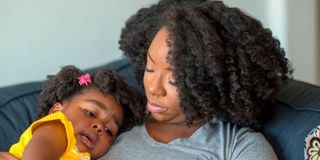Insomnia in children: Symptoms, treatments and how to manage

The first line of treatment should always include advice from a doctor or paediatrician.
What you need to know:
- Talk to your child’s doctor or mental health professional if you feel that insomnia is a problem for your child.
- The consequences of insomnia in children can be severe such as poor school performance and low energy levels.
Children too are victims of the inability to sleep. This is can be due to their growing brains and developing body systems. The consequences of insomnia in children can be severe: Poor school performance and low energy levels. Read on to know the symptoms, treatments, and how you can decrease your child’s risk of developing insomnia.
Symptoms of insomnia in children
- Inability to sleep at night or is restless during sleep.
- Your child is tired and cranky during the day.
- Loss of interest in activities they used to enjoy.
- Fights before going to bed.
- They start wetting the bed after being dry for a long time.
- Complaints about physical pain such as headaches or stomach aches.
Causes of insomnia in children
- Having underlying sleep disorders such as obstructive apnea.
- Stress or anxiety about school, bullying, social interactions/relationships not going well.
- Nightmares and bad dreams can cause children to wake up in the middle of the night crying and unable to fall back asleep without parental help.
- A child with underlying medical conditions such as asthma may have trouble sleeping.
- If the child is used to sharing a bed with the parent and is moved to their own bed, it can lead to separation anxiety, making it hard for them to fall asleep.
- Diets can affect a child’s sleep too. For example, caffeine is a stimulant and can make it harder for a child to fall asleep.
- If they watch TV or play video games before bedtime, the light from these devices may keep them awake.
Effects of insomnia on children
- When children do not get enough sleep, it can affect their school performance. They may have trouble paying attention and memory loss during the day, leading to poor grades and tardiness.
- Lack of sleep, especially in teenagers, may cause impaired decision-making.
- They may become irritable, leading to issues with friends and family.
- It can lead to stress that causes headaches and stomach problems. It may also cause them to be more prone to accidents because of low energy levels.
Treatments for insomnia in children
There are several ways to treat this condition, both at home and with the help of medical professionals. The first line of treatment should always include advice from a doctor or paediatrician. They will take into consideration the child’s condition and its severity.
To reduce stress or anxiety that may affect your child’s sleep, look into natural remedies such as meditation, yoga, breathing exercises, etc.
Other ways to help improve sleep include.
- Make sure that their bedroom is ideal for sleep with cool temperatures, appropriate noise levels, and good ventilation.
- Keep the child active during the day with plenty of exercise. This will make the exhausted are ready to sleep at night.
- Make sure they have a consistent bedtime routine.
- Reading them a bedtime story to clear their minds.
- Make sure that they get the recommended hours of sleep every night for full benefit.
- If your child’s primary cause of insomnia is bullying, try to help them clear their worries and deal with the bully.




